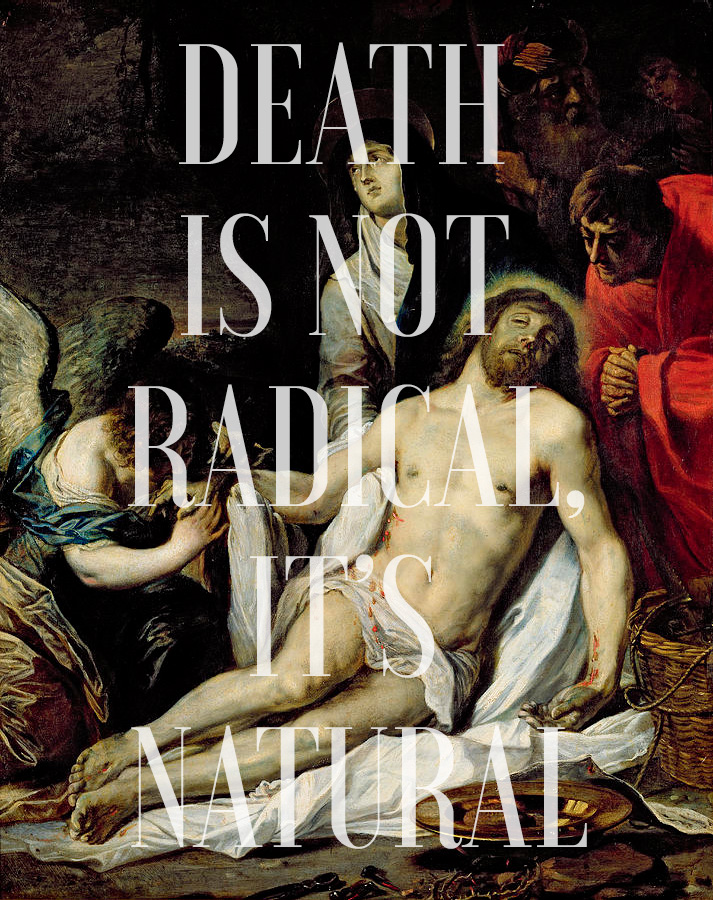
Death (of God or anything else) is Not Radical, it’s Natural: A Good Friday Reflection
“Jesus said to her, “I am the resurrection and the life. The one who believes in me will live, even though they die;”” John 11:25
Good Friday is the day Christians commemorate the crucifixion and death of Jesus. There are a few theories out there regarding why Good Friday is called “Good Friday.” The one I like the most is the one most historians and linguists prefer, that the word “Good” in Good Friday could be substituted with the word “Holy” (read: sacred). But why would a day where Jesus dies be considered Holy or good? Obviously, the stories about the events of Good Friday have numerous layers of meaning and interpretive possibility; the idea that Jesus did not just die, but was murdered/executed for sedition has huge political significance for instance. But one thing that most people can agree on is that death, as something looming which we all must face, comes to the forefront on Good Friday.
Along these lines, one aspect of Good Friday that has become increasingly popular to isolate is the notion that atheism and the “death of God” is implied/embedded in the crucifixion events of Good Friday. I’m thinking of some of the concepts found in radical death of God theologies in particular here, which might be found to be espoused by folks like Nietzsche, Altizer, Žižek, and even Bonehoeffer. To be sure, I like a lot of what these thinkers have to say; some of these radical theological concepts can be great tools, psychologically speaking, for helping people who are addicted to transcendent “escape plan” types of theologies for instance. But one thing that has bothered me for a while is that I do feel some radical death of God thinkers fetishize death by isolating it and, essentially, end up doing a great disservice to it by over emphasizing it and making such a big, scary, existential/angsty deal out of it. Death, strictly speaking (I’m not talking about untimely, unjust death or murder here), is not new, or profound, or shocking, or dreadful, or bad.
Perhaps, instead of thinking of death in unhelpful ways, as being extreme, severe, harsh, extraordinary or radical, we can think of death again in generative terms, as being natural, creative, sacred, holy, and yes, even good.
For a while now, instead of thinking about the polarity of birth and death in positive-negative terms, I’ve really become adamant about training myself to think of birth and death as a positive-positive polarity. That is, birth and death are permanently-recurring dichotomies that shouldn’t be resisted but accepted as being both natural and creative at every level of reality. Evolutionary eco-theologian, Michael Dowd, has been really inspiring to me in this regard. The idea that, from a larger, cosmic perspective, “my sense of “self” does not stop with my skin” is so deeply insightful. Dowd writes:
“Earth is my larger Self. The Universe is my even larger Self: my Great Self. So, yes, “I” (in this expanded sense) will continue to exist even after “I” (this particular body-mind) comes to a natural end. There is deep comfort in knowing that my larger Self will live on. More, I am powerfully motivated to be in action today precisely because I do not ignore or deny the inevitability of death. My small self has but a brief window of opportunity to delight in, and contribute to, the ongoing evolution of the body of life.”
The torturous method, injustice, and untimeliness aside, Jesus’s actual death on the cross (the permanent halting of his vital biological processes) was not perverse, weird or unnatural. No. It was ordinary, just like ours is going to be. Evolution of complex life depends on differential death; for life to be seen as natural, death must be naturalized. And that’s, in part, why this Friday is called good.

[…] if life is sanctified and holy this ultimately must mean that death is sanctified as well since both birth and death are natural parts of life. I’ll talk more about this below when I reflect on murder and […]